Bahá’í Community News
Regional Conferences of the Five Year Plan
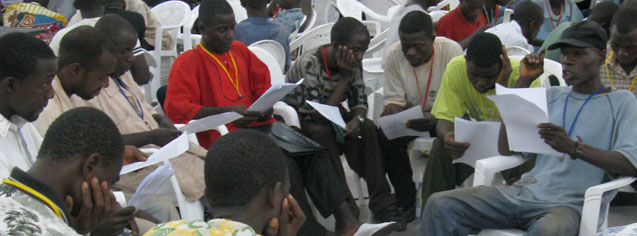 Baha’is from seven west African countries participated in the Abidjan conference.
More photographs
Baha’is from seven west African countries participated in the Abidjan conference.
More photographsThe Abidjan Regional Conference
3–4 January 2009
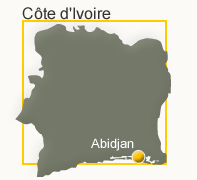
The arrival of 11 busloads of Baha’is was cause for celebration at the conference in Abidjan after border delays and other challenges almost prevented three-quarters of the 1,200 participants from reaching the historic gathering.
Baha’is who had already gathered in Abidjan anxiously awaited the overland travelers from Sierra Leone, Liberia, Guinea, and parts of Cote d’Ivoire, who because of political turmoil and other factors were experiencing long delays and outright challenges to their passage. But the travelers were determined, and when the buses finally arrived – several hours after the originally scheduled starting time for the conference – the exhausted people went straight to the venue so that the proceedings could get under way.
In all, seven countries – Cote d’Ivoire, Gambia, Guinea, Liberia, Mali, Senegal, and Sierra Leone – were represented at the conference, held at a hotel in Abidjan, the largest city in Cote d’Ivoire.
“They teach us lots of great things. We learn how to pray.”
Youngster from a children’s class in Abidjan cluster
Attending as representatives of the Universal House of Justice were Mr. Stephen Hall and Mrs. Joan Lincoln, both members of the International Teaching Center. Also participating were three counselors for West Africa, Dr. Maziar Djoneidi, Mrs. Agatha Gaisie-Nketsiah, and Mr. Desmond Browne. The sessions were conducted in three languages – English, French, and Yacouba.
Mrs. Lincoln and Mr. Hall addressed the gathering several times, describing developments in the Baha’i world over the past 50 years and discussing recent capacity-building efforts, which are enabling more and more people to work with increasing effectiveness for the betterment of their communities.
Participants share experiences
Each country made a presentation of achievements in their area and lessons learned. Recurring themes included the power of individual initiative and the importance of people learning from the experiences of other communities.
Representatives from Cote d’Ivoire reported that they had made an initial goal of establishing 11 intensive programs of growth during the current five-year plan, but with war and displacement in the country they began to assume it would be an impossible task. Now, however, midway through the five years, they have already established five of the programs, and eight more look possible by April 2010 despite serious challenges.
Gambian participants reported how systematic action – where they assessed the human resources of their community, sent a representative to Ghana to learn how advances had been made there, and benefited from the experiences of visiting friends – raised the capacity of the community, resulting in an organized cycle of activity in Latrikunda.
One inspiring report came from a children’s class coordinator from the Abidjan cluster. She told of mustering the courage to offer a children’s class in her locality. Much to her surprise, her offer was accepted without much hesitation. Some time later, as a group of children were walking one day to the Baha’i Center for their class, a child on the street shouted out and asked where they were going. “To the Baha’i Center,” someone answered. “They teach us lots of great things. We learn how to pray.” It wasn’t long before the questioning child joined the class, too.
At the end of the first day, a cultural program featured six women and a man from the Danane region of Cote D’Ivoire, dressed in beautiful traditional attire, who drew the audience into the spirit of the gathering with singing that filled the room, accompanied by the masterful drumming of a 13-year-old youth. The mood led others to the stage to share traditional dances, and there were also presentations by the Abidjan choir, by Baha’i communities of Mali and Liberia, and by individuals from all seven of the countries represented at the conference.
The second day
The Sunday sessions opened with the friends from the Danane region leading the gathering in devotional music. Although many people didn’t know the language of the songs, they joined in by dancing and clapping, creating a joyful, energetic mood that lasted throughout the day.
The workshop sessions – where participants consulted on plans for future activities in their home communities – were influenced both by what people had heard at the conference and by the sacrifices they had made to get there.
(Indeed, for hundreds of people the difficulties in getting to Abidjan were overwhelming. One man described the trip as one of the most difficult experiences of his life but said afterwards that the anticipation of the conference made it all worthwhile. Some of the Baha’is traveled 1,800 kilometers to reach Abidjan – from Senegal it took five days of driving, across three countries.)
The friends from Guinea decided during their workshop to accelerate plans for one of their intensive programs of growth by advancing the target date. They said the impetus to move with more urgency was fueled by their experience in persevering – through days of traveling and detention at the border – to reach the conference.
After the last formal presentation of the conference, one participant described the spirit as “electric,” leading people to rise in a spontaneous song.
Comments from participants
Ningou Coulibaly, Abidjan, Cote d’Ivoire: “It was wonderful to hear people share the successes they have been experiencing in their individual acts of service. These have inspired me greatly and I am energized to go back into the field of service.”
Haruna Kerta, age 21, Monrovia, Liberia: “When I get back home I will try to participate in one or two core activities. I was lacking the courage to act before, and this conference has given me that.”
Danielle Kone, age 20, Bouake, Cote d’Ivoire: “I learned that we have a tough task – we have to make a mighty effort to find all the waiting souls who are receptive to the Faith.”
Siisi Nketsiah, age 24, Accra, Ghana: “I realized that the current framework and lines of action which the Universal House of Justice (gives us) truly work. From the presentations of those who have arisen to serve, it is clear that once you arise, the confirmations come.”
Thomas N’dri, age 41, Abidjan, Cote d’Ivoire: “It is said that the world is but one country, but in seeing all the friends from the region, this became real to me. I was especially touched by the sacrifice of some – who spent days on the road – to do the bidding of Baha’u’llah. In the past, faith was very abstract to me, too much theory, too intellectual. But, now it is so practical – the activities are simple and well articulated.”

More than 1,200 people attended the conference. Three-quarters of them encountered serious transit problems, but they made it to Abidjan by mid-morning Saturday.

Cote d’Ivoire, Gambia, Guinea, Liberia, Mali, Senegal, and Sierra Leone were the countries invited to the conference.
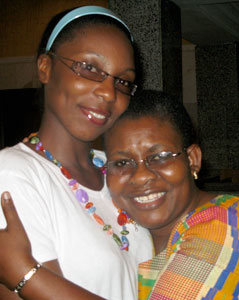
Old friends had a chance to catch up with each other.
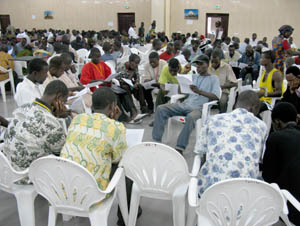
Despite transit problems, one attendee said the chance to be a part of such a “momentous conference” was reward enough.
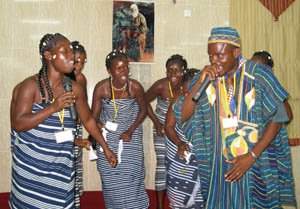
The Ivorian singers from Danane electrified the conference with their performance.
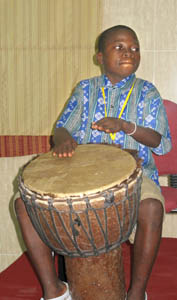
The group from Danane was accompanied by what one participant called the “masterful drumming of a 13-year-old.”
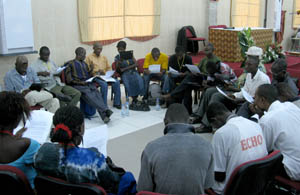
For many of the people, the trip to Cote d’Ivoire represented the first time they had traveled outside their own country.
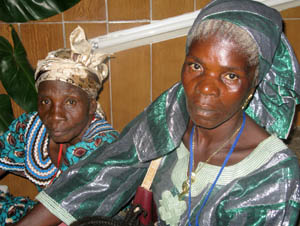
Participants often describe the gatherings as helping to build confidence in their work at the local level.
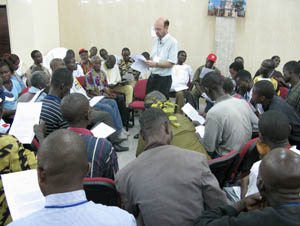
At workshop sessions, people have the opportunity to consult on messages from the Universal House of Justice.
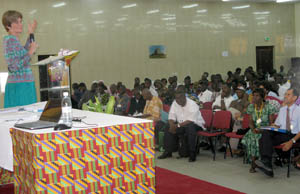
Mrs. Joan Lincoln, one of the two representatives of the Universal House of Justice, addresses the conference.









